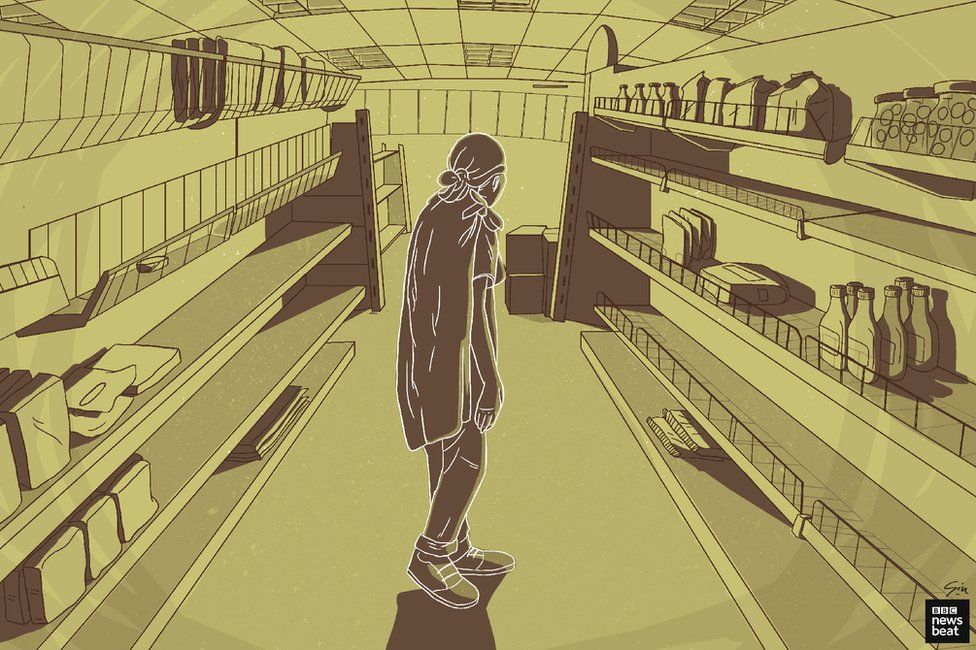We need to talk about Venezuela
- Published

There is something odd going on with your country's economy if sanitary towels are on sale for £140.
Recently the government in Venezuela criticised the makers of Always for charging 1,389 bolivars for a pack of their Postparto maternity pads.
"This is a criminal act against the Venezuelan people," Minister for Women Gladys Requena said.
Procter & Gamble said the pads are one of many on sale, with a more basic product going for 19.7 bolivars (£2).
On the black market, the same pads would cost $3.50 (£2.20) but such huge price differences and a scarcity of goods are not unusual.
Venezuela, located on the north coast of South America, has a diverse landscape including both the Andes mountains and the Amazon basin.
President Nicolas Maduro's government blames foreign businesses for deliberately damaging Venezuela's economy by hoarding products and by pricing goods at a cost that is unfair.
Endless queues outside supermarkets and police patrolling shops are an every day reality in a country where annual inflation stood at a reported 69% last year (inflation in the UK is about 0%).
It's not just food that is hard to find. Coffins, condoms and batteries are among the many products that have been scarce in recent years.
"It was ridiculous that you couldn't get toilet paper," says student Paola Ferrero, who left Venezuela more than nine months ago.
The 28-year-old is now at a university in London and says one of the first things she noticed when she arrived was the "many options" available in UK supermarkets.
She says back in Venezuela she managed without products like milk but it was much harder for the elderly and people with young children to cope.
Many medications are also in short supply there and it's claimed women with breast cancer have had mastectomies instead of getting radiation because there is not enough money to maintain equipment in hospitals.
One doctor described it as "doing medicine from the 1940s".
Venezuela and the US are currently in diplomatic talks. The US has accused Venezuela of human rights abuses and introduced sanctions against the South America country - stopping it working with American firms.
President Maduro came to power in April 2013 following a special election after the death of Hugo Chavez.
The country has lots of oil but for years poor people felt they weren't getting their fair share of the money. President Chavez took over many oil companies and used the money to fund policies popular with poorer Venezuelans, but opposed by other groups in society.
Supporters said his economic reforms and his expansion of social programmes helped the poor benefit from the country's oil export revenues.
The current president's term of office has seen "growing discontent" among the general population, according to Amnesty International.
The human rights organisation points to poor conditions in the nation's prisons and a justice system where some criminals go unpunished and the government can interfere in cases.
Violent crime is a problem in Venezuela and Paola says many people in her life have been directly affected.
"I was kidnapped when I was younger," says Paola.
"It's so profitable for the criminals and they know they won't get put in jail. They stole cars and they stole money.
"I can't really feel I went through something horrible because so many other people have gone through so much worse."
She believes that the kidnappings have become more "violent" in recent years, explaining: "Before you had certainty that you would not get killed or raped, now that's completely uncertain."
Student groups, like the one Paola was a part of, have frequently taken to the streets to demonstrate since Maduro took power.
She says: "2014 was a terrible year for Venezuela.
"Economically 2015 is worse, but in 2014 I saw how kids were taken arbitrarily, I saw how they were tortured."
More than 43 people died and a further 878 were injured during the protests in early 2014, says Amnesty International.
"Prisoners have been beaten, burnt, sexually abused, asphyxiated, electrocuted and threatened with death while in custody," the organisation says.
"The world has [turned] a blind eye," says Paola.
"Most of the governments in the region are either pro-leftist or have a lot of oil interests with Venezuela so they choose not to say anything as if it was right for all these things to happen."
There is a lot she loves about her country; the food, the music, the sense of friendship with the community.
"I believe that the moment things start to change mildly for good then a lot of people who are abroad will definitely come back and work for Venezuela," she says.
"I know that I will."
But until that happens, she asks that people keep watching what happens to the people of Venezuela.
"It would be really nice to have some solidarity and see that as young people we support each other," she says.
"I would definitely encourage young people to follow the situation. That would be great."
Many people in Venezuela remain loyal to Chavismo - the type of socialism the late president promoted. Mr Chavez was in power for 14 years.
Supporters say he improved quality of life for many, while critics say his overspending in government caused some of the current economic problems.
One woman told BBC reporters that she saw a massive reduction in poverty, inequality and malnutrition while he was in power.
"We have no reason to complain," she said.
"You can find food, our houses are painted, the streets are calm. We even have health centres."
Follow @BBCNewsbeat on Twitter, BBCNewsbeat on Instagram, Radio1Newsbeat on YouTube and you can now follow BBC_Newsbeat on Snapchat